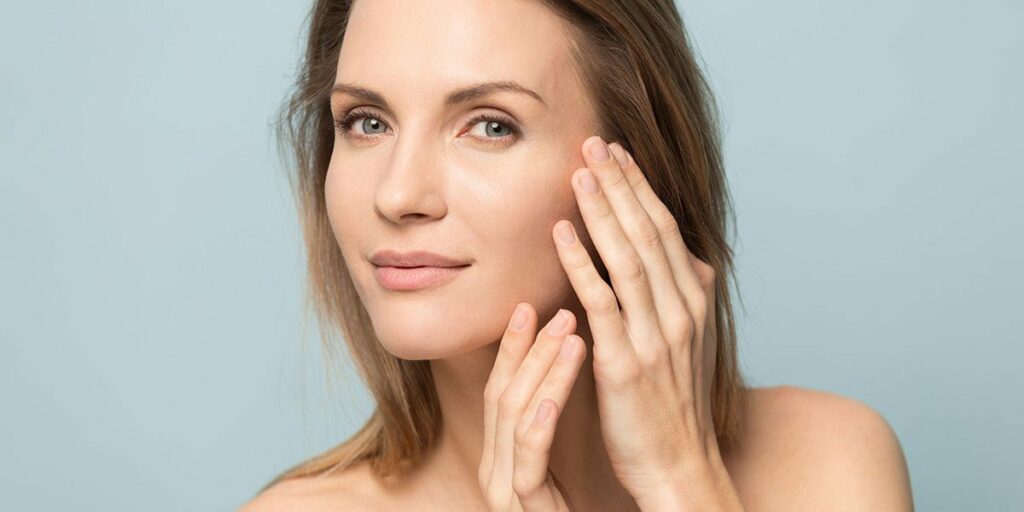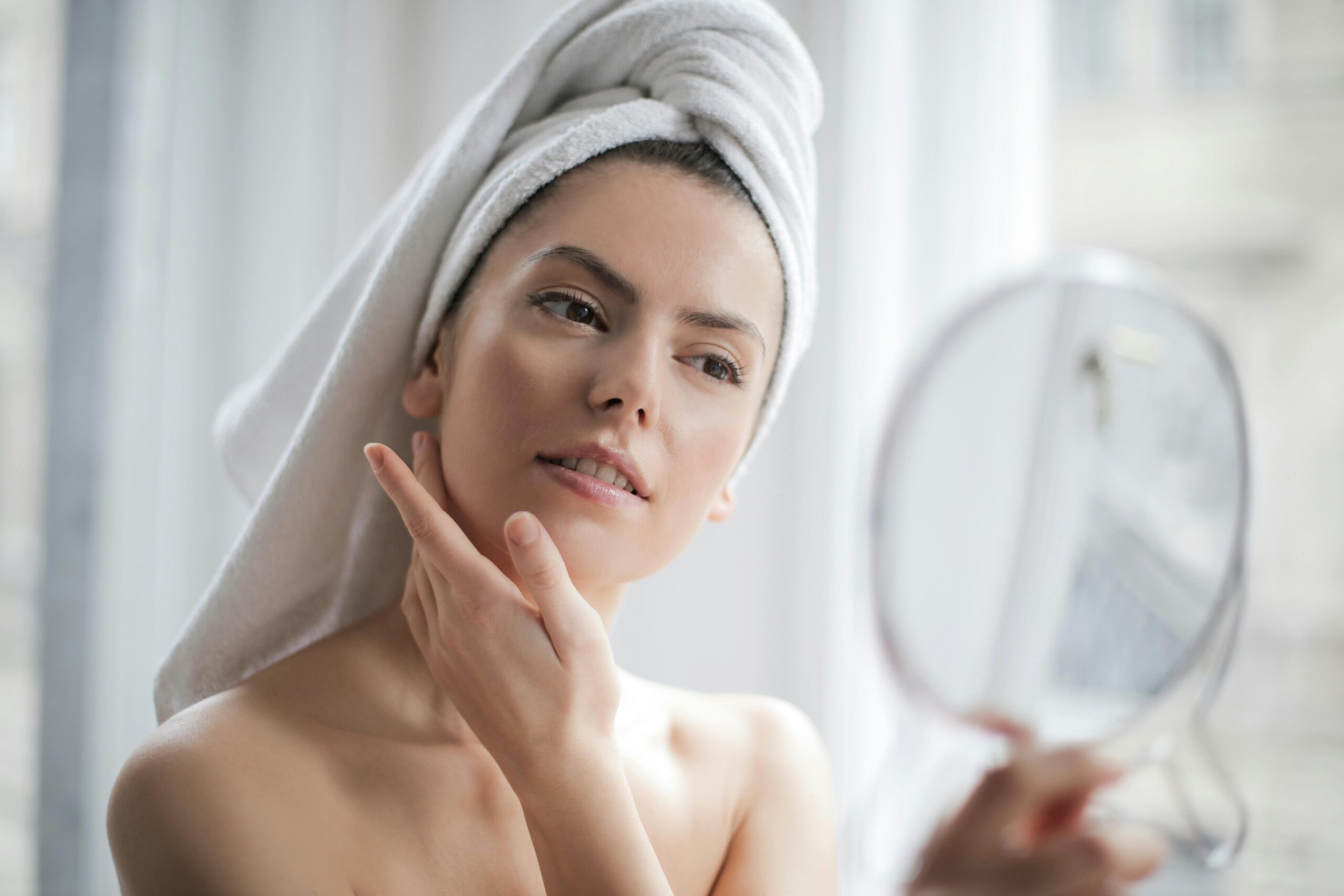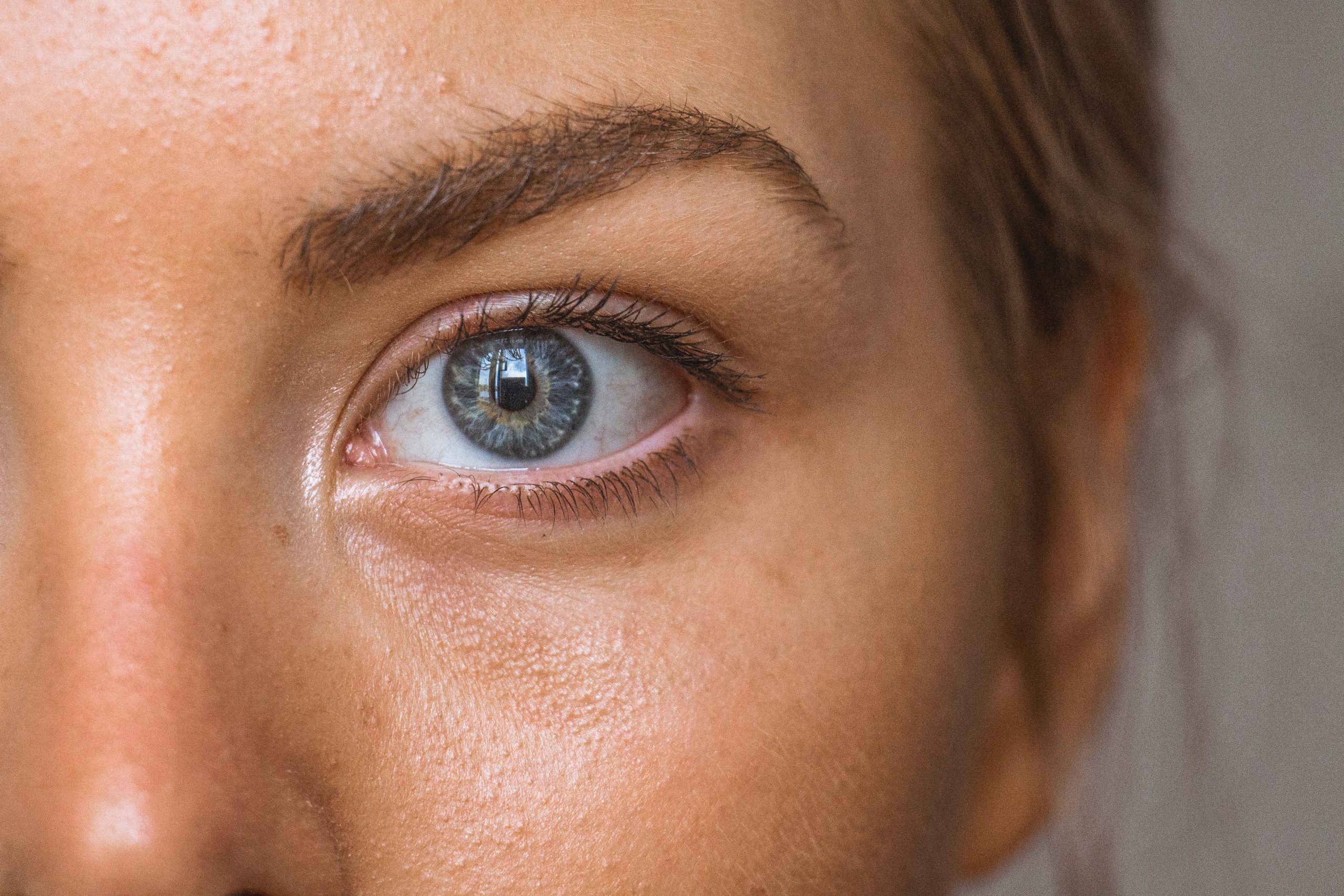The skin – it’s the largest organ of the human body and as beauty experts, you know just how complex and fascinating it actually is! Composed of 2 main layers, the epidermis and the dermis, the skin forms a protective barrier between the body and the external world. Keeping the skin healthy is not just desirable from a cosmetic point of view but most importantly, it is a mirror to the health of the body.
In this blog we will take a closer look at the skin barrier – the outermost layer of the skin – and discover why it is crucial to boost the health and vitality of this delicate yet most important part of the human anatomy.
What Is The Skin Barrier?
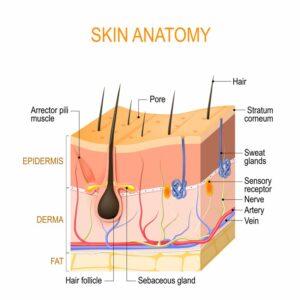
The outermost layer of the epidermis, the stratum corneum, is a specialised layer that protects the body from the harsh aspects of our environment; UV, pollution, toxic chemicals, infection to name a few. This outermost layer of skin cells is held together by the lipid matrix, composed of ceramides, cholesterols and fatty acids. The skin barrier is often described as the bricks and mortar, which acts as a security guard for your skin, preventing potential problems passing through. If this barrier is weakened or damaged, irritants can penetrate and skin becomes sensitive, leading to a whole host of skin issues. Many of the dermatological issues you see in your clinic such as dryness, acne and chronic inflammation, will have a link back to the skin barrier. Understanding how to heal and strengthen this vital element of the skin is paramount.
One of the most important functions of the skin barrier is to protect it from trans-epidermal water loss. As this term suggests, it locks in moisture to keep skin soft, supple and firm. When the skin barrier is damaged, the quick loss of water, leaves skin feeling tight and dehydrated. Clients may suddenly experience irritation from products they have been using for a long time and skin becomes red and inflamed.
How does the Skin Barrier become damaged?
A skincare routine can literally make or break it! The use of harsh or very alkaline cleansers, over-washing, over-exfoliation, using too many products, strong acne medication can all play a role in weakening the skin barrier. Life style factors also impact the health of the skin barrier – stress is a big one, with the chemical response in the body causing the skin to become more sensitive and reactive. Changes in hormones can also weaken the skin barrier function so women going through menopause, for example, may suddenly find the skin becomes dry and inflamed.
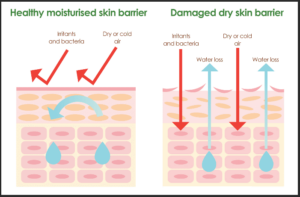
How to heal a weakened skin barrier?
Research clearly shows that a nutritious diet full of vitamins, minerals and essential fatty acids, help to maintain a strong skin barrier as well as exercise and adopting healthy habits. Taking care of the skin requires a holistic approach to truly meet its needs.
A skincare routine that focuses on using nourishing, gentle products is key. Less is more when beginning to treat damaged skin. Using products that help to lock in moisture such as Hyaluronic Acid as well as Niacinamide to increase ceramide production and rich, creamy moisturisers will begin to restore the lipid matrix. Hydration is key when treating the skin barrier so keep it coming! The use of gentle, milky based cleansers and avoiding any type of astringents or exfoliation for a while, will give the skin barrier a chance to heal. Depleted skin lipids can be replaced using products rich in antioxidants and encourage clients to work from the inside out by optimising their diet and taking supplements if needed.

The skin barrier is the part of the skin we can see which makes it all the more important when it comes to boosting its health and vitality. There’s nothing better than knowing you have helped to restore a client’s confidence when their skin is looking and feeling its best.
We were lucky enough to gain more in depth knowledge of the skin barrier from business woman, coach and mentor, Gay Wardle, just last week. Gay is an internationally recognised speaker and educator within the beauty industry and her passion for skin analysis along with her ability to teach others, makes her an exceptional asset to your growing business. We are thrilled to share with you Gay’s presentation for Vital Plus on the skin barrier – just click on this link: The Skin Barrier With Gay Wardle
I’d love to hear your ideas on this subject. Let me know your experiences, your thoughts and suggestions, and I’ll make sure to share as many of these with our followers.
We love sharing our passion for healthy skin with our therapists and love seeing their successes. That’s what inspires us every single day. Supporting you in running a successful beauty business is our purpose.
Call us for more information: 1300 437 638
FAQs:
Q: What is the skin barrier?
A: The skin barrier, also known as the epidermal barrier, is the outermost layer of the skin that serves as a protective shield against external factors. It is a complex structure composed of lipids, proteins, and skin cells, designed to prevent moisture loss and protect the body from harmful substances, microbes, and environmental pollutants.
Q: How does the skin barrier function?
A: The skin barrier functions as a robust defense system. It contains ceramides, fatty acids, and cholesterol, which form a protective lipid layer, preventing water from evaporating and maintaining skin hydration. Additionally, the skin barrier acts as a barrier to harmful pathogens and allergens, preventing them from entering the body.
Q: What are the signs of a compromised skin barrier?
A: A compromised skin barrier may exhibit several noticeable signs, including:
- Dryness: Increased water loss due to a damaged barrier can lead to dry and flaky skin.
- Sensitivity: A weakened barrier allows irritants to penetrate, causing redness, itching, and sensitivity.
- Breakouts: A damaged barrier can lead to an imbalanced skin microbiome, resulting in acne or other blemishes.
- Increased Sensitivity to Products: Products that were previously well-tolerated may cause stinging or burning sensations.
- Inflammation: Inflammation and redness may be more apparent due to a compromised barrier’s reduced ability to protect against external irritants.
Q: What causes damage to the skin barrier?
A: Several factors can damage the skin barrier, including:
- Overexfoliation: Excessive exfoliation can strip away the protective layer of the skin.
- Harsh Skincare Products: Using products with aggressive ingredients, like alcohol or certain acids, can disrupt the skin barrier.
- Environmental Factors: Exposure to harsh weather conditions, pollutants, and UV radiation can weaken the barrier.
- Poor Diet: A lack of essential nutrients can compromise the skin’s ability to repair itself.
- Age: As we age, the skin’s natural barrier function can decline, making it more susceptible to damage.
Q: How can I repair a compromised skin barrier?
A: To repair a compromised skin barrier, follow these steps:
- Gentle Cleansing: Use a mild, soap-free cleanser to avoid further irritation.
- Moisturize: Apply a rich, emollient moisturizer to lock in moisture and support barrier repair.
- Avoid Harsh Products: Steer clear of harsh skincare products and ingredients that may aggravate the skin.
- Sun Protection: Always wear sunscreen to shield your skin from harmful UV rays.
- Stay Hydrated: Drink plenty of water to maintain skin hydration from within.
- Nutrition: Consume a balanced diet rich in vitamins, antioxidants, and healthy fats to support skin health.
Remember, restoring a damaged skin barrier takes time and consistency, so be patient and gentle with your skin during the repair process. If issues persist, consider consulting a dermatologist for personalized advice and treatment.
